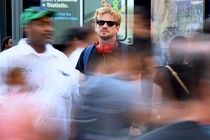Nobody’s Watching: The unpredictability of life
- Argentine filmmaker Julia Solomonoff invites us to walk beside a Latin American immigrant in the USA, joining him in a reflection on courage, adaptation, identity, place and self-deception

Last weekend, the Tribeca Film Festival played host to the international premiere of Nobody’s Watching [+see also:
trailer
film profile], Julia Solomonoff’s third film after the superb Sisters and The Last Summer of la Boyita [+see also:
trailer
film profile]. The film is a co-production between the USA,France and Spain, and is backed by Isabel Coixet, who, through her production company Miss Wasabi Films, is lending support to emerging female talent (a mission that also led Coixet to produce Elena Trapé’s The Distances [+see also:
film review
trailer
interview: Elena Trapé
film profile]).
Produced in a mix of English and Spanish, Nobody’s Watching takes us on a fascinating, critical and contemplative journey into the mind of a Latin American in New York. 30-Year-old Nico (sensitively portrayed by Cordoba-born actor Guillermo Pfening) has left his native Argentina, where his personal life was somewhat complicated but his career was going pretty well, his work as an actor on a popular TV series having brought him success, stability and fame. In the Big Apple, of course, he’s a complete unknown, recognisable only to the odd Latina mother watching her child play football in a city park — because to make ends meet, Nico has been employed by a well-off friend to look after her baby.
It’s a similar premise to Jorge Torregrossa’s 2013 film, La vida inesperada [+see also:
film review
trailer
interview: Jorge Torregrossa
film profile], starring Javier Cámara and Raúl Arévalo and producedby Beatriz Bodegas (of La Canica Films, the company behind The Fury of a Patient Man [+see also:
film review
trailer
interview: Raúl Arévalo
film profile]) — an actor finds himself forced to take any job he can get to keep chasing after his dream of overcoming the city’s ruthless social dynamics and becoming a New Yorker — although in this case, the main character is visited by friends rather than family, and there’s not a lot of comic relief to be found.
Nico soon discovers that, when it comes to finding work as a Latino actor in the USA, being blond is a bit of a hindrance: the cliché of the swarthy, exotically accented hunk looms large over the auditions he shows up to. The idea of being watched, to which the film’s title alludes, is an undercurrent that runs right through this tremendous film: if nobody sees us steal, then maybe we aren’t really thieves; if nobody recognises us, then maybe we aren’t anyone at all, even if with anonymity comes freedom... and solitude. And, if nobody is watching, maybe we are free to indulge in a clandestine sexual relationship — only for it to end up consigned to a cold, dark corner, shameful and sordid, nothing like the ideal of the love that we want and deserve.
Looking beyond its apparent simplicity, we can read Nobody’s Watching in a multitude of ways, including as a reflection on the forms of self-deception we hide behind when we lack the courage to face up to conflict. In this film, Solomonoff ponders the fantasies we perpetuate in trying to create a reality that more closely resembles our dreams; dreams that not even a society so supposedly open and receptive as the USA can turn into solid reality — just an abstract concept that becomes more dubious and more doubted every day.
Nobody’s Watching was filmed in New York and Buenos Aires, based on a screenplay written by Solomonoff and Christina Lazaridi. The film was produced by Cepa Audiovisual (Argentina), MadLove Film Factory (Colombia), Taiga Filmes e Video (Brazil), Aleph Motion Pictures (US), La Panda Productions (US) and Travesía Producciones (Argentina). The co-producers were Miss Wasabi (Spain), Perdomo Productions (Dominican Republic), Shortcuts International (Lebanon) and Epicentre Films (France). It received funding from the Ibermedia programme, the INCAA (Argentina), ANCINE (Brazil) and Proimágenes-FDC (Colombia). International sales are being handled by FiGA Films, based in Miami (Florida).
(Translated from Spanish)
Did you enjoy reading this article? Please subscribe to our newsletter to receive more stories like this directly in your inbox.

























